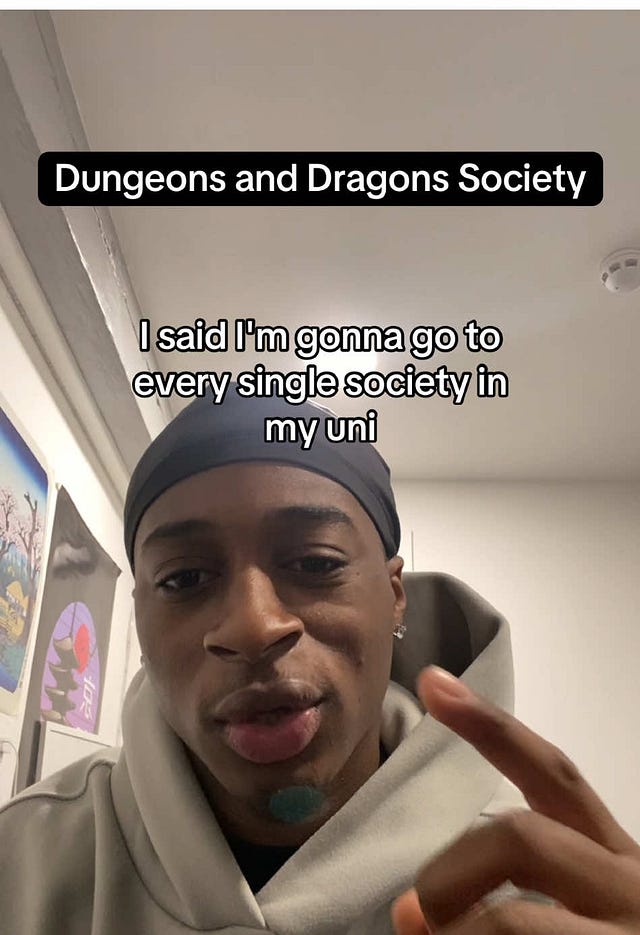Handouts from the universe
Why the 2024 word of the year might be hindering gen z
Hello!
Thank you for joining me, I’m so glad you’re here.
Last Saturday I spent the day with MBA students at the University of Suffolk, speaking to them about employer branding. I had an amazing day, talking the students through what goes into attracting the right talent to an organisation. And their questions really helped me consider things from different angles.
But when I got up in front of them, these words tumbled out of my mouth - “I feel like a fraud talking to you about this”. I’m not a shy person, and I’ve done lots of public speaking before (if you’d like to give me further speaking opportunities, I’d love to speak with you!)
And yet with employer branding I was surprised to feel a bit insecure, because the newness of the field means that it’s not a refined art yet, and besides, I’m completely self-taught so at the end of the day, who am I to advise these students?
Nonsense, I know.
When I got into recruitment properly, it was through working at an apprenticeship provider, and my role was to go about the county and tell the youth all about these newly improved things called apprenticeships. I’d get students on my books and train them in interview skills, and workplace behaviour and so on, while cold calling companies trying to get them a £3 ish an hour job through which they could do their training.
This was a masterclass in recruitment marketing (different to employer branding, but still a very important element of it). I could be on an assembly stage doing a 10 min pitch to students, following some student recruiter from a university, each of us trying to win the students over with stats morphed to show them the bounty that could be had if they just went to university/studied an apprenticeship.
I built social media accounts, created and hand-distributed leaflets…used anything to try to ethically influence decisions.
It wasn’t really until 2020 when I was working at a tech company and my manager put me on an employer brand tiger team, with a great agency, that I understood how all these skills I’d picked up fit into this wider world of employer branding. We created a vision, and mapped out every touchpoint a candidate may have and ensured a continued story of who we are and what we offered.
I’m disappointed that the first words out of my mouth were putting down my experience, but I hope that I accurately described how exciting it is to be in this growing field. As I said to the students, when you’re marketing products, and your customers make a poor choice, most of the time there are options for them to put it right. When you’re selling a company, you’re selling someone’s who life. If your workplace makes you happy, fulfilled, challenged, and embraced for who you are…then your whole world is different to when you don’t have these things at work. It’s a really special and important line of work.
Do you know what the 2024 Cambridge Dictionary word of the year was?
Manifest.
I was listening to the brilliant Australian podcast Shameless discuss it back in December, and how we’re at a point in time where things aren’t going right for so many people, especially gen z who were told in assemblies a decade ago that if they did X then they would get good jobs and be able to afford a nice place to live and would be generally happy.
And that isn’t really the case for many out there.
The UK job market was picked up by a few newspapers this week, the main one being The Guardian, features a number of people who should be able to get jobs, but can’t. It also entertains the whole “AI is rejecting me” thing which isn’t great to see.
So in the face of this dire career landscape, gen z are turning to manifesting - telling the universe what they want, and in return it is given to them.
It’s not just those out of work who can make manifesting happen. I’ve seen quite a few younger employees quit out of things too soon because they weren’t given promotions or pay rises when they had deemed them appropriate. While I can list a number of gen z instances of this, I wonder if we millennials were/are really so different?
I left Nintendo back in the day when those around me who had started around the same time as me were given a promotion and I was left behind. I was LIVID. No reason was given, just that I was to be given a massive project and that I should “prove myself”, but instead I flounced off. It was only after I left that I had been told by a friend that there was a mark on my record because I’d asked a manager a question they thought I should know the answer to, and that meant I wasn’t ready to step up. While shame and hurt pride was the final straw for me, really the culture that lacked real feedback and structured development for people early in their careers like I was, was really the reason why it was time to go.
When a young employee who is in career-building-mode is keen to see progression and recognition for their work is making noises like they want to leave as they believe they deserve more - that the universe is willing to give them more - it can be tricky to support the managers leading them. I once worked with an employee who very suddenly handed in his notice, citing lack of development and mental health support as reasons why he wanted to explore other options. The manager, who was quite old-school, but did genuinely want to build a good culture, was devastated, saying that he’d gone out of his way to take the team for lunches, and made a real effort to talk about non-work things with them, including having an open door for difficult subjects like mental health. It sometimes feels that the language and frameworks used by each generation are universes apart, causing that strain.
Even when an employee has told the universe what they want, how likely is it that they will be given it? Whether they want to quit because they deserve a higher salary, or want to go out in search of a more empathetic manager, or would like a more employee-centric workplace culture, what are the chances of actually finding these things in 2025? I worry that a promotion of leaving things to the universe may encourage people quitting fairly standard opportunities on the off chance that something brilliant is around the corner, especially in this employer-driven market where there is little wiggle-room to allow “squiggly career” candidates to be given a chance.
For completeness, the Oxford University Press word of the year was “brain rot” and Collins Dictionary’s was “brat”. So I guess the youth of today are feeding their brains with nutritionless content, while manifesting better things for themselves and trying to have the time of their lives. Can’t blame them, really.
Links
You can tell I’ve been working on cleaning out my inbox because I have not one but two CIPD articles for you.
The first is about the skills gap between those who grew up in London and those who didn’t.
The second is quite a simple article about what to consider when starting apprenticeships. While it doesn’t really give proper help towards structuring the things it says you should consider, it is a good reminder that hiring apprentices needs different considerations and structures than hiring experienced hires. Perhaps that’ll be my topic next week…
We really need to stop asking applicants to do BS things as part of the process. Unless it’s related to the job (which in this case it doesn’t seem to be) then this kind of task has no place.
Keir Starmer wrote in The Times about how young people have it hard but also so did other people (calls himself working class), and that it’s a “scandal” to be claiming benefits if you can actually work. Aside from there being lots more scandals of people tax dodging that Keir could probably focus on, I bet a lot of people out of work would truly like to be gainfully employed. The Reddit thread for the article is very interesting, including an insightful comment from a school leader.
I love looking into data around what uni students are studying. It can say a lot. HE Marketing Expert Kyle has done a great summary of the key points - and it seems that degrees that can be applied in business are on the rise. Unsurprising as the anxiety around post grad employment rises.
Tools like Handshake are an absolute blessing for university recruiters as it allows them to post grad roles to a variety of unis - previously we’d had to log into each uni’s careers site and post each role manually. But while it makes things easier for us to post, it makes things easier for students to apply, and so the effort put into each application also drops. This insightful short post highlights things from the other side.
TikTok
I was served this as a targeted ad from LinkedIn…and it’s pretty good. Their new agency is doing some decent work - perhaps they could take over the “youth” version of LinkedIn too??
I’ve found more careers content for you - don’t you fret! Today’s career is an interior designer at Ikea, who puts together the little rooms in the shop. Love the comments section which include lots of “I had no idea this was a job!”
Some wholesome content to end today. This student is going to every single society at his uni and rating them. Here’s a video of him talking about going to a Dungeons and Dragons event:
 Tiktok failed to load.
Tiktok failed to load.Enable 3rd party cookies or use another browser
Have a great week!
Charlotte





